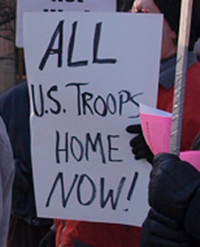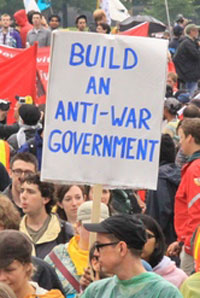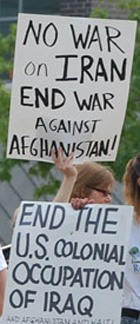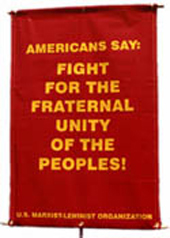Chicago NATO Summit, May 20-21
• Dismantle NATO! Fight for an Anti-War Government
• Washington Outlines NATO's 21st Century Mandate
To Contribute to Peace Worldwide
Dismantle NATO! Fight for an Anti-War Government
 The U.S. will be hosting the North Atlantic Treaty Organization (NATO) Summit in Chicago May 20-21. NATO currently has 28 member states, including the U.S. and European countries, and is the largest military bloc in the world. It was formed by the U.S. as part of the Cold War. NATO’s role then and since has been as an aggressive force and military arm of the U.S. acting against the peoples of the world.
The U.S. will be hosting the North Atlantic Treaty Organization (NATO) Summit in Chicago May 20-21. NATO currently has 28 member states, including the U.S. and European countries, and is the largest military bloc in the world. It was formed by the U.S. as part of the Cold War. NATO’s role then and since has been as an aggressive force and military arm of the U.S. acting against the peoples of the world.
While some NATO commanders may be from Europe, NATO is under U.S. command and used to serve its empire building. This can be seen in the in NATO’s participation in the U.S. war against Afghanistan and invasion and occupation of Libya and earlier against Yugoslavia. It is U.S. aggression that instigating of these wars, and U.S. military forces, funding, and political dictate that maintains NATO.
The U.S. has made clear that the upcoming Summit is not geared toward securing peace in the world, which would mean dismantling NATO as a relic of the Cold War. Instead discussion on how to keep U.S. and NATO troops and bases in Afghanistan is on the agenda, along with updating and expanding NATO military capabilities. It is a summit designed to “cement” the U.S. ability to use NATO to do its fighting worldwide and to have it at the ready in the event of world war.
Though attempts are made to keep them under wraps, conflicts between the U.S. and other imperialist powers in Europe, like Germany and France, are very sharp. In part to satisfy Germany, the U.S. is calling on NATO to extend its Baltic Policing Force, which has had German jets patrolling the Russian border. But will such a move backfire? Germany has its own interests, as was evident during the war against Yugoslavia where Germany and the U.S. contended for supremacy, contributing to splitting Yugoslavia. Germany's attempt to impose austerity on Greece and other European countries and France's attempt to dominate the International Monetary Fund also reveal the rivalry over control of Europe.
The deepening economic and political crises facing all the European countries and the U.S. means these inter-imperialist conflicts will sharpen. The U.S. hopes to use its military might to keep everyone in check and direct NATO against Russia, China and the peoples of the world. The Summit will likely reveal how far they are succeeding with this.
The peoples of the world have made clear that U.S. aggression and dictate and military blocs like NATO have no place in today’s world. NATO must be dismantled by Bringing All U.S. Troops Home Now! Demonstrations at previous Summits and those planned for Chicago reject the notion that peace comes through bombing and military aggression. More than this, repeated experience recently, such as that with Palestine, Libya, and Haiti, show that imperialist claims to be interested in “humanitarian aid” are completely false. U.S. organized and led military intervention has brought humanitarian catastrophes wherever it goes. U.S/NATO actions have created millions of refugees, horrendous conditions for women and children, destroyed civilian infrastructure while not solving any problem. Military intervention by the U.S., alone or using NATO is a block to peace.
 What is needed to contribute to peace in the world is to demand, All U.S. Troops Home Now! Dismantle NATO! No to U.S. criminal wars of aggression and military interference of all kinds! People in the U.S. and the world do not need to have the Pentagon and NATO expanded. The stand of the peoples is anti-war. The war criminals gathered at the NATO Summit, led by President Obama, need to be charged with war crimes and removed from power.
What is needed to contribute to peace in the world is to demand, All U.S. Troops Home Now! Dismantle NATO! No to U.S. criminal wars of aggression and military interference of all kinds! People in the U.S. and the world do not need to have the Pentagon and NATO expanded. The stand of the peoples is anti-war. The war criminals gathered at the NATO Summit, led by President Obama, need to be charged with war crimes and removed from power.
What we do need are anti-war governments. We need to organize in the U.S. to oppose the U.S. and NATO, and more importantly to fight for our own pro-social, anti-war agenda. This includes organizing today to be the decision makers, in our collectives, at our schools and workplace, in society. It means selecting and becoming our own worker politicians that represent the interests of the working class and people, not the rich. Our united stand against war and for a new pro-social direction for society that puts the rights of all in first place must have its own representatives, its own organized forces.
Let us work together for an anti-war government! Let us organize to strengthen the fraternal unity of the peoples by defending the rights of all and demanding that the U.S. pay reparations for slavery and all its crimes and cancel the debts of the peoples of Asia, Africa and the Americas. These are contributions to peace.
Dismantle NATO: Bring All U.S. Troops Home Now! [TOP]
Fight for an Anti-War Government!
"Global NATO" Is "America's NATO"
Washington Outlines NATO's 21st Century Mandate
The State Department's top Eurasia hand addressed the House Committee on Foreign Affairs's Subcommittee on Europe and Eurasia on April 26 to present Washington's perspective on and expectations of next month's summit of the North Atlantic Treaty Organization.
In a presentation titled "The Chicago Summit and U.S. Policy," the Principal Deputy Assistant Secretary for European and Eurasian Affairs, Tina Kaidanow, laid out what the military alliance's main powerhouse and financial backer demands of its 27 allies and in so doing indicated many of the top geopolitical objectives of her department and the U.S. government as a whole for the upcoming years.
Commenting on the fact that the May 20-21 gathering of over fifty heads of state from nations supplying troops for the longest war in her nation's history, that in Afghanistan, will occur in Chicago, only the second NATO summit in the U.S. and "the first ever outside of Washington," Kaidanow reiterated the main purpose of the world's only military bloc:
 "Our hosting of the Summit is a tangible symbol of the importance of NATO to the United States, as well as an opportunity to underscore to the American people the continued value of the Alliance to the security challenges we face today... NATO is vital to U.S. security. More than ever, the Alliance is the mechanism through which the U.S. confronts diverse and difficult threats to our security... Our experiences in the Cold War, in the Balkans, and now in Afghanistan prove that our core interests are better protected by working together than by seeking to respond to threats alone as individual nations."
"Our hosting of the Summit is a tangible symbol of the importance of NATO to the United States, as well as an opportunity to underscore to the American people the continued value of the Alliance to the security challenges we face today... NATO is vital to U.S. security. More than ever, the Alliance is the mechanism through which the U.S. confronts diverse and difficult threats to our security... Our experiences in the Cold War, in the Balkans, and now in Afghanistan prove that our core interests are better protected by working together than by seeking to respond to threats alone as individual nations."
What the House members listening to her, if not the casual reader, would understand by the above comments is that NATO is the chief vehicle employed by the State Department, White House and Pentagon to advance American political, economic and military interests in Eurasia and increasingly the rest of the world. As such, it's well worth the U.S.'s efforts to provide the preponderance of its funding and military assets and further engineer its evolution into an expanding, ultimately global, military-political network.
Kaidanow included an elementary school primer-level synopsis of NATO's history from its founding -- "For ... 40 years ... we ... stood united in purpose against the specter of communism" -- until the fall of the Berlin Wall, after which "NATO helped to rebuild Central and Eastern European -- countries while integrating them into the trans-Atlantic community of democratic states."
The latter was accomplished by absorbing every former Soviet ally in the Warsaw Pact, and three past Soviet republics, into the alliance from 1999-2009, in the process conscripting troops from every one of them for deployment to war zones in Iraq and Afghanistan. No troops from the Warsaw Pact except the Soviet Union had been deployed outside Eastern Europe during the entire Cold War period.
Her presentation dutifully echoed that of her boss, Secretary of State Hillary Clinton, in the latter's speech at the World Affairs Council 2012 NATO Conference on April 3. The U.S. is the only NATO member whose leading officials speak authoritatively in advance of the outcome, in fine detail, of the upcoming summit as the nation effectively determines the agenda, with a friendly nod in the direction of its fellow NATO Quint states -- Britain, France, Germany and Italy -- but nevertheless calling all the important shots. One wonders why, except for a vain propensity for pageantry and pomposity, summits are held at all given that the results have been decided upon long in advance.
Early in her talk Kaidanow invoked the new Strategic Concept adopted at the last NATO summit in 2010, particularly highlighting the bloc's Article 5 mutual military assistance (war) clause, affirming that "First and foremost, NATO remains committed to the Article 5 principle of collective defense."
That article is responsible for the stationing of 152,000 troops, at peak strength, from 50 nations in Afghanistan.
 When Kaidanow spoke of "integrating them [twelve Eastern European nations incorporated into NATO from 1999-2009] into the trans-Atlantic community," she was in fact if not openly confirming the practical results of NATO expansion: To provide the U.S. and its Western allies with air, infantry, naval, radar and drone surveillance, missile, strategic airlift, cyber warfare and other bases and facilities east of the former Berlin Wall and legionaries for neocolonial wars and military occupations in the Balkans, Asia and Africa.
When Kaidanow spoke of "integrating them [twelve Eastern European nations incorporated into NATO from 1999-2009] into the trans-Atlantic community," she was in fact if not openly confirming the practical results of NATO expansion: To provide the U.S. and its Western allies with air, infantry, naval, radar and drone surveillance, missile, strategic airlift, cyber warfare and other bases and facilities east of the former Berlin Wall and legionaries for neocolonial wars and military occupations in the Balkans, Asia and Africa.
She has been no disinterested observer in that process. In her current position and in a post that preceded it, Kaidanow has cultivated and consolidated the power of what are without dispute Washington's two most favored -- and pampered -- satraps, Georgia's Mikheil Saakashvili and Kosovo's Hashim Thaci, than whom there are no less savory and more malicious heads of state in the world. If the sociopathic ghoul in Kosovo and the megalomaniacal self-styled reincarnation of the medieval King Davit IV in Georgia are indicative of the U.S.'s political alliances, and if an empire can be judged by the foreign stooges it employs, then Washington has plummeted to a new imperial nadir.
Like most of the current American foreign policy elite, Kaidanow cut her teeth in the Balkans in the 1990s, her first State Department assignments being in the U.S. embassies in Serbia (1995-1997) Bosnia (1997-1998) and Macedonia (1998-1999), in the last instance focusing on neighboring Kosovo.
She attended the infamous Rambouillet conference in February of 1999 where the American delegation headed by Secretary of State Madeleine Albright threw down the gauntlet to Yugoslavia with the infamous Appendix B ultimatum and set the stage for the 78-day war that began on March 24. Rambouillet was also at the debut of American asset Thaci, then an underworld kingpin and head of the so-called Kosovo Liberation Army, who was even then being groomed as the head of state he became in 2008 ahead of Kosovo's unilateral declaration of independence in February of that year. Four years later a majority of the world's nations still don't recognize his organized crime-ridden fiefdom as a nation.
Kaidanow was the Chief of Mission and Charge d'Affaires at the U.S. Office in Kosovo from July 2006 to July 2008, until the George W. Bush administration appointed her the first American ambassador on July 19 of the latter year.
In 2009, as Deputy Assistant Secretary of State for European and Eurasian Affairs (her Principal Deputy Assistant Secretary position, a promotion, was obtained last July), she visited Georgia a year after the Saakashvili regime invaded South Ossetia, thereby provoking a five-day war with Russia, and met with Defense Minister Bachana (Bacho) Akhalaia to discuss modernizing the nation's armed forces (described as "reforms"), the impending deployment of U.S. Marine Corps-trained Georgian troops to Afghanistan to serve under NATO command and the U.S.-Georgia Charter on Strategic Partnership signed four months after the war of the preceding year. She returned two months afterward for the same purpose.
In her April 26 appearance before the House committee, she hailed NATO as an alliance of "like-minded states who share our fundamental values of democracy, human rights, and rule of law." NATO's first war, against Yugoslavia thirteen years ago, and its partnerships with nations in former Soviet space have produced the likes of Hashim Thaci and Mikheil Saakashvili. Democracy, human rights and the rule of law.
Speaking of goals to be discussed and promoted at the Chicago summit, she said:
"In addition to being a collective security alliance, NATO is also a cooperative security organization. Unlike an ad hoc coalition, NATO can respond rapidly and achieve its military goals by sharing burdens. In particular, NATO benefits from integrated structures and uses common funding to develop common capabilities. "
That is, NATO is a mechanism for the permanent military integration of European states for the purpose of the U.S. securing auxiliary troops for wars outside the Euro-Atlantic zone.
Concerning the first of three main items of discussion at the summit, the war in Afghanistan, Kaidanow asserted:
 "[T]he Summit will make clear that NATO will not abandon Afghanistan after the ISAF mission concludes. In Chicago, the Alliance will reaffirm its enduring commitment beyond 2014 and define a new phase of cooperation with Afghanistan. "
"[T]he Summit will make clear that NATO will not abandon Afghanistan after the ISAF mission concludes. In Chicago, the Alliance will reaffirm its enduring commitment beyond 2014 and define a new phase of cooperation with Afghanistan. "
As to the true and residual purpose of the Afghan campaign, she added, "we must continue our efforts to develop NATO's role as a global hub for security partnerships," which Afghanistan has been used as the crucible for.
The latter relates to the third point, building worldwide military partnerships, regarding which one is reminded of Aesopian cautionary tales about being offered cooperation by wolves and lions. Upon hearing such propositions, a sensible creature starts inching backward into the sheep pen or out of the lair.
The other priority at next month's summit is what both Kaidanow and Clinton before her referred to as critical defense capability requirements, with the former saying, "NATO's ability to deploy an effective fighting force in the field makes the Alliance unique" and that, pressuring allies to cough up the funds to ensure it, "its capacity to deter and respond to security challenges will only be as successful as its forces are able, effective, interoperable, and modern."
To reinforce and flesh out the above, she added:
"The United States is modernizing its presence in Europe at the same time that our NATO Allies, and NATO as an institution, are engaged in similar steps. This is a clear opportunity for our European Allies to take on greater responsibility. The U.S. continues to encourage Allies to meet the two percent benchmark for defense spending and to contribute politically, financially, and operationally to the strength and security of the Alliance."
She, like her superior at Foggy Bottom, accentuated several key projects in Europe, the most important of which is the U.S.-created European Phased Adaptive Approach interceptor missile system.
Kaidanow acknowledged commitments already obtained to that end in Poland, Romania, Turkey and Spain and said, "We would welcome additional Allied contributions."
Another summit item is the further integration and expansion of intelligence, surveillance, and reconnaissance (ISR) capabilities. Lest anyone be confused about the purpose of those and mistake them as in any way defensive in character, the following comments from Kaidanow will disabuse them of the notion:
 "Allies contributed more combat power in Libya than in previous operations (almost 90 percent of all air-to-ground strike missions in Libya were conducted by European pilots, as compared to 10 percent in the Kosovo air campaign in 1999). However, Libya demonstrated considerable shortfalls in European ISR capabilities as the U.S. provided one quarter of the ISR sorties, nearly half of the ISR aircraft, and the vast majority of analytical capability. This past February, NATO defense ministers agreed to fund the Alliance Ground Surveillance (AGS) program. The five drones that comprise this system will provide NATO with crucial information, including identifying potential threats, monitoring developing situations such as humanitarian crises, and distinguishing possible targets for air strikes."
"Allies contributed more combat power in Libya than in previous operations (almost 90 percent of all air-to-ground strike missions in Libya were conducted by European pilots, as compared to 10 percent in the Kosovo air campaign in 1999). However, Libya demonstrated considerable shortfalls in European ISR capabilities as the U.S. provided one quarter of the ISR sorties, nearly half of the ISR aircraft, and the vast majority of analytical capability. This past February, NATO defense ministers agreed to fund the Alliance Ground Surveillance (AGS) program. The five drones that comprise this system will provide NATO with crucial information, including identifying potential threats, monitoring developing situations such as humanitarian crises, and distinguishing possible targets for air strikes."
She also spoke of the now over eight-year patrol of the Baltic Sea sky by NATO warplanes which this year has been extended to 2018, which is to say in perpetuity, revealing an interesting link along the way: "This helps assure the security of allies in a way that is cost effective, allowing them to invest resources into other important NATO operations such as Afghanistan. "
Kaidanow also assured her congressional interlocutors -- again in advance; see above comments -- that next month's NATO summit will endorse the Deterrence and Defense Posture Review (DDPR).
Doing so "will reaffirm NATO's determination to maintain modern, flexible, credible capabilities that are tailored to meet 21st century security challenges. The DDPR will identify the appropriate mix of nuclear, conventional, and missile defense capabilities that NATO needs to meet these challenges..."
She then touted the role of NATO's global partnership arrangements, "working with a growing number of partners around the world," as they "allow the Alliance to extend its reach, act with greater legitimacy, share burdens, and benefit from the capabilities of others."
Regarding which regions among others the expanding military partnerships will be focused on, Kaidanow stated: "In light of the dramatic events of the Arab Spring and NATO's success in Libya, we envision a particular focus on further engagement with partners in the wider Middle East and North Africa region."
She also promoted a new category of nations being cultivated for full NATO accession called aspirant countries -- currently Bosnia, Georgia, Macedonia and Montenegro -- which are "all working closely with Allies to meet NATO criteria so they may enter the Alliance."
Regarding the most controversial of those four candidate nations, Georgia, she insisted:
"U.S. security assistance and military engagement support the country's defense reforms, train and equip Georgian troops for participation in ISAF operations, and advance its NATO interoperability. In January, President Obama and President Saakashvili agreed to enhance this cooperation to advance Georgian military modernization, defense reform, and self-defense capabilities... U.S. support for Georgia's territorial integrity within its internationally recognized borders remains steadfast, and our non-recognition of the separatist regions of Abkhazia and South Ossetia will not change."
***
 The U.S. makes decisions for the military bloc it created and its 27 allies rubber-stamp them.
The U.S. makes decisions for the military bloc it created and its 27 allies rubber-stamp them.
With the results already determined, the claim by NATO that it is an alliance of equals and that their summits are in any way deliberative is given the lie.
What has already been decided, as confirmed by Deputy Secretary Kaidanow on April 26, is that NATO will remain the world's only nuclear alliance, one which will continue stationing U.S. strategic weapons on air bases in European countries under NATO's nuclear sharing arrangement.
• That NATO military forces, including the NATO Training Mission — Afghanistan, will remain in Afghanistan long past 2014.
• That the U.S. will steadily expand its interceptor missile system from one end of Europe to the other under NATO auspices.
• That the U.S. and NATO will continue to move military forces and equipment to Russia's borders.
• That the hallmark of NATO mutual obligations is the bloc's Article 5, which commits all members to intervene, up to and including going to war, on behalf of any member state which requests intervention.
• That NATO will be used to recruit national contingents from scores of nations for military actions like those in Afghanistan and Libya.
• That NATO will continue to build a global military network even beyond its 80 or so current members and partners.
[TOP]
